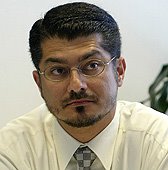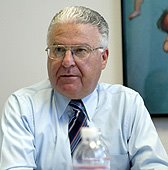Round table: Representatives of county's Muslim and Jewish communities discuss whether there is common ground to bridge the gap between the two communities here and in mid-east.
By ANN PEPPER
The Orange County Register
Thursday, August 24, 2006
http://www.ocregister.com/ocregister/news/abox/article_1253151.php
Are "Muslim fanatics" at the root of Middle East unrest? Is Israel racist in its policy toward refugees who want to return there? Are there areas of common ground that could lead to better understanding between Jews and Muslims in Orange County? Events in the Middle East resonate here as increasing discomfort – even animosity – between some. Just days ago the Register asked self-described moderate leaders in those two communities – Hussam Ayloush, rabbis Heidi Cohen and Lawrence Goldmark, and Sheik Yassir Fazaga – who was unable to attend – to meet for a roundtable discussion. What could they say to each other and to their communities in an effort to build trust and understanding?
----
Hussam Ayloush

Hussam Ayloush is the executive director of the Anaheim-based Southern California chapter of the Council on American-Islamic Relations.
Rabbi Heidi Cohen

Rabbi Heidi Cohen is a rabbi at Temple Beth Sholom in Santa Ana and the immediate past president of the Orange County Board of Rabbis.
Rabbi Lawrence Goldmark

Rabbi Lawrence Goldmark of Buena Park is rabbi at Temple Beth Ohr in La Mirada
and executive director of the Pacific Association of Reform Rabbis.
Rabbi Lawrence Goldmark: I think where we want to start is with the word "peace." Anything which causes peace to be postponed in the Middle East or here between us needs to be addressed.
Rabbi Heidi Cohen: Just that we're able to sit down together, recognize each other and have discussions together sends a message to our communities.
Hussam Ayloush: To be successful we need to try to de-emphasize what I'll call tribalism – my side right or wrong. Instead, keeping to our shared strong values of justice, humanity, fairness, compassion … .
Goldmark: You are dealing with American Jews who have political views toward Israel. Views not based on religious beliefs. There is no doubt that there are Jews who look at the Middle East and will say: "Just bomb 'em out." But it is nowhere near the feeling of the overwhelming majority of Jews here or in Israel.
Ayloush: From the Muslim perspective, for us, we felt from the beginning that this is a major misunderstanding in America – that this is a religious conflict. Because it is not a religious conflict. At least not for the overwhelming majority of Muslims. Which isn't to say that there aren't extremists who use this, make it sound like a religious war because it is the easiest way to justify the hatred. Rather than having to go over issues like U.N. resolutions or moral rights.
Goldmark: I am not saying it is a political dispute rather than a religious one. From the Jewish perspective, I believe we are dealing with Muslim religious fanatics. Are you saying that we should remove the term "Muslim fanatic"?
Ayloush: I think we need to acknowledge that these conflicts are about legitimate political grievances. And that the conflicts in Darfur, Palestine and Chechnya are very different with different solutions. The conflict in the Middle East is what, 55 or 60 years old? When did Islamism become a leading factor in the conflict? In 1983. With the Israeli invasion of Lebanon, which created Hezbollah. Before that, how come the Palestinian resistance was mainly Christian? Was that Christian fundamentalism? The others failed and the Islamists became more popular in the 1980s. But this is very nationalistic in Palestine. Two groups of people fighting over the same piece of land.
Goldmark: Would you be willing to be quoted that you are opposed to Hamas and Hezbollah's stated goals of destroying Israel?
Ayloush: Absolutely. I've been quoted as saying that. But I add to it that all parties in the Middle East, including Hamas, Hezbollah and Israel have committed terrorism.
Goldmark: But where I would start, what I want, is recognition of the inherent right of Israel to exist. Period. I don't see that on the part of the Arab/Muslim community. I'm saying, if you have come out and said – I am opposed to the statement that Israel should be destroyed – and your organization holds that position, it is where we can start.
Ayloush: But for us, the issue of the 6.5 million refugees is extremely important. Because if ... for many in the American Jewish community ... the return of the refugees is tantamount to the demographic destruction of Israel, I believe that is a very racist view. That is, if Israel can find room for a Jew from Russia who has never been there, but not for others, someone who might still hold the key to their homes ... .
Cohen: But how do we sit down and talk together? Earlier, there was a discussion of security in our synagogues, our mosques and our communities. We have common ground with these things. We are not going to solve the issues in the Middle East right now. But in sitting around this table we can talk about how we coexist here in America and have respect for each other's communities.
Ayloush: Yes. Eventually the other issues will have to be dealt with. But I am not going to use the issue of the refugees as a hindrance to working together on a million other things. It has taken a long time, and I am being very frank, for us to understand that the issue of Israel is such a highly sensitive one for the Jewish community (in America). It is actually more of a sacred cow than Judaism itself. Maybe there is a fear that there is no recognition of Israel.
Goldmark: Yes! Fear of the destruction of the state of Israel.
Ayloush: And I have to understand that that is something that has been a shadow on the discussion maybe. And maybe there is more need for the local Muslim community to explain that every poll and every survey that's taken shows people have accepted the two-state solution.
Cohen: But how are we going to affect the Middle East here? To be honest, we're not. There's a lot of money and moral support going over there, but … we are not sitting at that table.
Goldmark: All we know here in Orange County is that this is a starting point. There are people here who would not have walked into this room because one or the other of us is here. And that shouldn't be forgotten. We are here. Together.

No comments:
Post a Comment